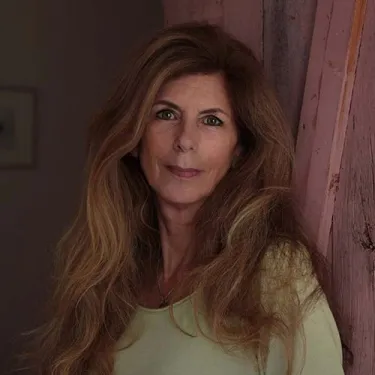Marie Howe
Visiting Poet

Marie Howe sees her work as an act of confession, conversation, prayer. She says simply, “Poetry is telling something to someone.” According to the distinguished poet Stanley Kunitz, Howe’s “telling” is “luminous, intense, and eloquent, rooted in an abundant inner life.” Her work glows with light and lightness that bear heavy questions of existence. Alicia Ostriker considers her “among our most gifted poets of trauma and healing.”
Part of the urgency and importance of Howe’s poetry stems from its rootedness in real life. Her latest book, Magdalene, transforms driving, watching television and cleaning kitchen counters into prayer and meditation on mortality. As Mary Magdalene becomes every woman, our contemporary anguish is set on surprisingly common ground with divine and metaphysical preoccupations. As Nick Flynn puts it, Howe “has always come as close as any poet since Rilke to touching eternity, simply by stretching out her hand and believing that something exists beyond her grasp, beyond her knowing.”
Howe maintains that poetry “has the quality of a spell.” It is “incantatory,… as its roots can never wholly be pulled out from sacred ground.” Her language does not simply carry the unsayable—it seems to ask what it ought to do with the pain. Just ten minutes into her 1987 residence at the MacDowell Colony, Howe received a call from her brother John telling her that her mother had had a heart attack. Two years later, John died of AIDS, and What the Living Do is in large part an elegy to him, and was chosen by Publisher’s Weekly as one of the five best poetry collections published in 1997. Howe went on to co-edit In the Company of My Solitude: American Writing from the AIDS Pandemic.
Howe’s poetry is intensely intimate, and her bravery in laying bare the music of her own pain is part of its resonance. She received the 2015 Academy of American Poets Fellowship, and served as the New York Poet Laureate from 2012-2014. Her poems have appeared in the New Yorker, The Atlantic, Poetry, AGNI, Ploughshares, Harvard Review, The American Poetry Review, among others. Kunitz selected Howe for a Lavan Younger Poets Prize from the American Academy of Poets, and poet and novelist Margaret Atwood named Howe’s first collection, The Good Thief, for the National Poetry Series. Recipient of fellowships from the Bunting Institute at Radcliffe College and the Guggenheim Foundation, Howe teaches creative writing at Sarah Lawrence College and New York University.
Select Poems
No matter how many times I try I can’t stop my father
from walking into my sister’s room
and I can’t see any better, leaning from here to look
in his eyes. It’s dark in the hall
and everyone’s sleeping. This is the past
where everything is perfect already and nothing changes,
where the water glass falls to the bathroom floor
and bounces once before breaking.
Nothing. Not the small sound my sister makes, turning
over, not the thump of the dog’s tail
when he opens one eye to see him stumbling back to bed
still drunk, a little bewildered.
This is exactly as I knew it would be.
And if I whisper her name, hissing a warning,
I’ve been doing that for years now, and still the dog
startles and growls until he sees
it’s our father, and still the door opens, and she
makes that small oh turning over.
From THE GOOD THIEF (Persea Books, 1988)
I didn’t want to look at the huge white egg the mother spider dragged
along behind her, attached to her abdomen, held off the ground,
bigger than her own head-
and inside it: hundreds of baby spiders feeding off the nest,
and in what seemed like the next minute,
spinning their own webs quickly and crazily,
bumping into each other’s and breaking them, then mending
and moving over, and soon they got it right:
each in his or her own circle and running around it.
And then they slept,
each in the center of a glistening thing: a red dot in ether.
Last night the moon was as big as a house at the end of the street,
a white frame house, and rising,
and I thought of a room it was shining in, right then,
a room I might live in and can’t imagine yet.
And this morning, I thought of a place on the ocean where no one is,
no boat, no fish jumping,
just sunlight gleaming on the water, humps of water that hardly break.
I have argued bitterly with the man I love, and for two days
we haven’t spoken.
We argued about one thing, but it really was another.
I keep finding myself standing by the front windows looking out at the street
and the walk that leads to the front door of this building,
white, unbroken by footprints.
Anything I’ve ever tried to keep by force I’ve lost.
From WHAT THE LIVING DO (W.W. Norton, 1998)
The last time we had dinner together in a restaurant
with white tablecloths, he leaned forward
and took my two hands in his hands and said,
I’m going to die soon. I want you to know that.
And I said, I think I do know.
And he said, What surprises me is that you don’t.
And I said, I do. And he said, What?
And I said, Know that you’re going to die.
And he said, No, I mean know that you are.
From WHAT THE LIVING DO (W.W. Norton, 1998)